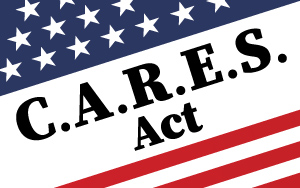 By: Rania V. Sedhom
By: Rania V. Sedhom
It’s unclear when COVID-19 truly made its presence known. However, most retailers were closed in major markets by mid-March and had no choice but to make decisions that immediately affected their employees, customers, and supply chain. Most of the companies with whom I work furloughed 50 percent of their employees and moved operations to online only. Seemingly a good plan, it became shaky as time progressed because uncertainty about the virus increased.
Companies asked themselves:
- Is it safe to have employees working in the warehouse or stockroom, preparing shipments?
- Does it make sense to slash prices by 30 percent or more?
- How do we preserve customer loyalty while conducting sales and marketing during
the pandemic? - Are our employees better off working part-time or being laid off?
- How long can we sustain our business with a broken supply chain?
The Coronavirus Aid, Relief, and Economic Security (CARES) Act, enacted by the Federal Government, meant to address unemployment and cash flow. However, several gaps appear in the law and businesses need to make careful decisions. It is impossible to discuss all aspects of this 880-page law in a short article, but a few sections may be of interest to retailers, particularly as they relate to their sales personnel. Interestingly, the two provisions highlighted below are, in the author’s opinion, not complementary; rather, they are diametrically opposed in their effect.
Paycheck Protection
Small employers with less than 500 employees can apply for a loan that covers, amongst other things, salaries, paid sick leave, group healthcare benefits, employer pension contributions, and commissions, up to $100,000 per person. Federal taxes on those wages as well as wages for individuals residing outside of the US are excluded. If at least 75 percent of the loan is used for payroll costs for the 8 weeks immediately after funding, the loan will be forgiven. If not, employers will have 24 months to repay the loan at an interest rate of 1 percent.
Businesses can rehire employees previously laid off and will not be penalized if they rehire employees and/or eliminate the reduction in salaries by June 30, 2020. As such, businesses should ask themselves the following: (1) Do I agree to pay employees, particularly sales persons, to stay home for 8 weeks (presuming businesses will continue to be closed through June 30, 2020) and (2) If I keep individuals on payroll because I received a Paycheck Protection loan, do I agree to pay for up to 12 weeks of paid sick leave if the employee becomes ill with COVID-19 while they are home?
With one hand, the Federal Government is sanctioning loans to preserve jobs and, with the other hand, it is offering enhanced unemployment benefits that may pay benefits that are greater than earnings to some employees.
Expanded Unemployment Benefits
Under the CARES Act, unemployment benefits are available for those impacted by COVID-19 retroactively to January 27, 2020 and ending on or before December 31, 2020. Benefits will continue for up to 39 weeks. Individuals will receive the State statutory unemployment benefits ($504 per week in NY) plus $600 each week for up to four months (that’s $1102 per week in NY). After four months, benefits drop to the state statutory amounts.
Unemployment benefits of $1102 per week are the equivalent of a $57,304 annual salary, presuming the enhanced benefits continue for a year. Even with enhanced benefits for up to 4 months, it is likely more profitable for several individuals to stay home, at least until those benefits expire.
Paycheck Protection and Enhanced Unemployment Benefits seem to work in direct opposition and will test the philosophy and ideology of retailers and their employees alike.
 Rania V. Sedhom, Managing Partner of Sedhom Law Group, PLLC, is an attorney who provides practical and efficient solutions to complex problems. Her considerable interpersonal skills allow her to forge win-win relationships across diverse organizations and cross-functional stakeholders. She is also an expert legal and business commentator with appearances on national print and TV/radio media including BLOOMBERG BUSINESS RADIO, L.A. TIMES, CHICAGO TRIBUNE, BALTIMORE SUN, FORBES, INC., BUSINESS WEEK and CNN MONEY.
Rania V. Sedhom, Managing Partner of Sedhom Law Group, PLLC, is an attorney who provides practical and efficient solutions to complex problems. Her considerable interpersonal skills allow her to forge win-win relationships across diverse organizations and cross-functional stakeholders. She is also an expert legal and business commentator with appearances on national print and TV/radio media including BLOOMBERG BUSINESS RADIO, L.A. TIMES, CHICAGO TRIBUNE, BALTIMORE SUN, FORBES, INC., BUSINESS WEEK and CNN MONEY.